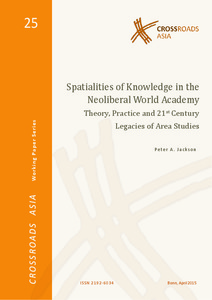Spatialities of Knowledge in the Neoliberal World AcademyTheory, Practice and 21st Century Legacies of Area Studies

Spatialities of Knowledge in the Neoliberal World Academy
Theory, Practice and 21st Century Legacies of Area Studies

| dc.contributor.author | Jackson, Peter A. | |
| dc.contributor.editor | Baldauf, Ingeborg | |
| dc.contributor.editor | Conermann, Stephan | |
| dc.contributor.editor | Kreutzmann, Hermann | |
| dc.contributor.editor | Nadjmabadi, Shahnaz | |
| dc.contributor.editor | Reetz, Dietrich | |
| dc.contributor.editor | Schetter, Conrad | |
| dc.contributor.editor | Sökefeld, Martin | |
| dc.contributor.editor | Hornidge, Anna-Katharina | |
| dc.contributor.editor | Bech Hansen, Claus Erik | |
| dc.contributor.editor | Kaiser, Markus | |
| dc.contributor.editor | Mielke, Katja | |
| dc.date.accessioned | 2016-10-05T15:18:03Z | |
| dc.date.available | 2016-10-05T15:18:03Z | |
| dc.date.issued | 04.2015 | |
| dc.identifier.uri | https://hdl.handle.net/20.500.11811/158 | |
| dc.description.abstract | In order to develop adequate understandings and theories of global modernity it is essential to overcome the intellectual hindrances of Euro-Amerocentrism, which is both an intellectual legacy of imperialism and a very contemporary form of neoliberal power over global knowledge production. What Houben (2013) has called the “new area studies” has a central role to play in this challenging task. In this paper I have considered the limitations and some of the major critiques of area studies, revealing the ways that forms of knowledge, including even critiques of area studies coming from the disciplines, are based on structures and patterns of spatiality. A key difference between the old and new area studies is that the old area studies accepted the spatiality of knowledge as given, usually being content to merely describe that situation, and in the process effectively reinforcing the power differentials that have tied forms of knowledge to certain locations. In contrast, the new area studies take a critical stance. The new area studies understands the spatiality of knowledge emerging from historical effects of power, both imperialism and neoliberal capitalism. The new area studies understands that the spatiality of knowledge is not natural or inevitable but emerges as a contingent effect of the inequalities in power between peoples located in different parts of the planet. From this understanding the new area studies takes an activist epistemological position that seeks to resist and challenge the power inequalities that anchor certain forms of knowledge to certain spaces and locations on the planet. Most particularly, the new area studies aims to position areas as sites of general knowledge and active theory production, not merely passive objects of the Euro-American intellectual gaze. | en |
| dc.format.extent | 47 | |
| dc.language.iso | eng | |
| dc.relation.ispartofseries | Crossroads Asia Working Paper Series ; 25 | |
| dc.rights | In Copyright | |
| dc.rights.uri | http://rightsstatements.org/vocab/InC/1.0/ | |
| dc.subject | Spatialities of knowledge | |
| dc.subject | New area studies | |
| dc.subject | Neoliberalism | |
| dc.subject | Modernity | |
| dc.subject | Eurocentrism | |
| dc.subject | Spatiality | |
| dc.subject | Imperialism | |
| dc.subject.ddc | 320 Politik | |
| dc.title | Spatialities of Knowledge in the Neoliberal World Academy | |
| dc.title.alternative | Theory, Practice and 21st Century Legacies of Area Studies | |
| dc.type | Arbeitspapier | |
| dc.publisher.name | Competence Network Crossroads Asia: Conflict – Migration – Development | |
| dc.publisher.location | Bonn | |
| dc.rights.accessRights | openAccess | |
| dc.relation.eissn | 2192-6034 | |
| dc.relation.url | http://crossroads-asia.de/veroeffentlichungen/working-papers.html | |
| ulbbn.pubtype | Zweitveröffentlichung |
Files in this item
This item appears in the following Collection(s)
-
Crossroads Asia Working Paper Series (37)
Working Paper des Kompetenz-Netzwerks Crossroads Asia




